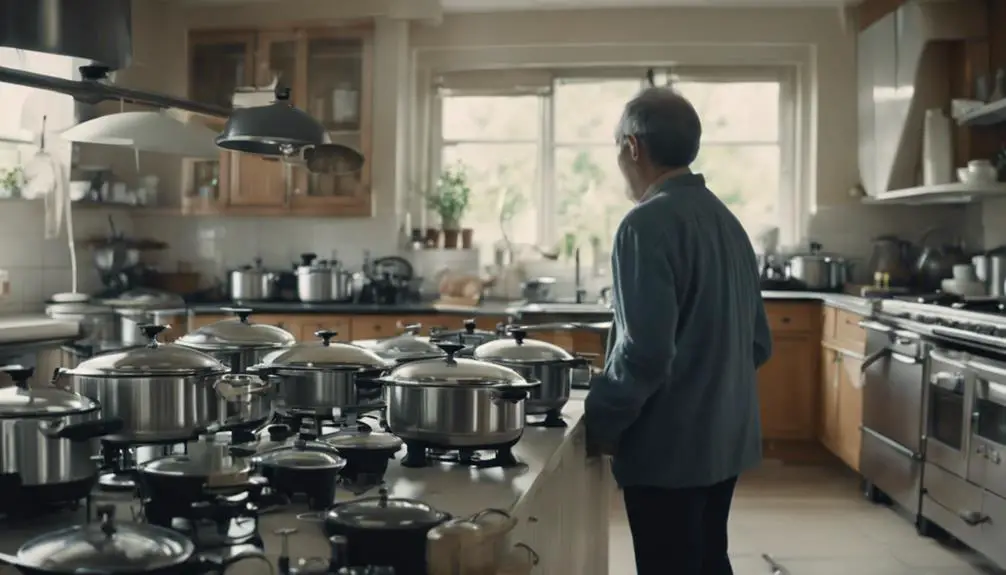If you're a busy professional looking to simplify meal preparation without sacrificing taste, selecting the right pressure cooker can be a game-changer.
But with so many options to choose from, how do you know which one truly fits your lifestyle and cooking needs?
Consider this: the type of pressure cooker you pick can significantly impact your overall cooking experience and culinary results.
So, how do you navigate through the myriad of choices to find the perfect match for your kitchen?
Key Takeaways
- Consider size based on household needs for optimal cooking and flexibility.
- Choose stainless steel or aluminum core for durability and material compatibility.
- Prioritize safety features like locking lids and pressure release valves for secure cooking.
- Select stovetop or electric based on cooking style and convenience preferences.
Benefits of Pressure Cooking
When considering the advantages of pressure cooking, you'll discover a multitude of benefits that make it a game-changer in the kitchen. Pressure cookers, whether electric or stovetop models, are designed to cook food faster than traditional methods by utilizing high pressure and steam. This not only saves you time but also helps retain up to 90% of the nutrients in your meals, making it a healthier cooking option. The steel construction of many pressure cookers ensures durability and even heat distribution, allowing for consistent results every time you cook.
With pressure cooking, you can tenderize tough cuts of meat in a fraction of the time it would take with slow cooking methods. The enhanced flavor infusion due to the high pressure and steam means your dishes will taste more vibrant and delicious. Electric pressure cookers come in various quart sizes to accommodate different serving needs, while stovetop models offer a more traditional cooking experience. Overall, the benefits of pressure cooking include efficiency, nutrient retention, flavor enhancement, and versatility in the kitchen.
Size Considerations
Choosing the right size for your pressure cooker depends on the number of servings you typically need to prepare. When considering size considerations, think about how many people you usually cook for and the types of meals you like to make. Here are some key points to help you decide:
- A 6-quart pressure cooker is a versatile option suitable for most households and can serve 4-6 people comfortably.
- For smaller households or individuals, a 4-quart pressure cooker is ideal and can still accommodate various recipes.
- If you often cook for larger groups or like to meal prep in batches, an 8-quart pressure cooker might be the best choice.
Opting for a slightly larger size is beneficial as it provides more flexibility for your cooking needs and allows you to try out different recipes with ease.
Consider the future as well; a larger pressure cooker can be handy for unexpected guests or when you want to cook extra for leftovers.
Material Selection
When choosing a pressure cooker, it's important to consider the durability of materials, the heat conductivity properties, and the safety features it offers.
These aspects will determine how well your pressure cooker performs and how long it will last.
Make sure to weigh these factors carefully to find the best option for your cooking needs.
Durability of Materials
For enhanced durability in your pressure cooker, opt for stainless steel over aluminum as it offers greater longevity and resistance to acidic foods. When considering the durability of materials for your pressure cooker, keep in mind the following points:
- Stainless steel pressure cookers are more durable and long-lasting than aluminum ones.
- Aluminum pressure cookers are prone to reacting with acidic foods, affecting taste and durability.
- Look for pressure cookers with a stainless steel or aluminum core for improved durability.
- Electric pressure cookers commonly use aluminum with non-stick coatings; however, these may not be as durable as stainless steel.
- Choose a pressure cooker material that aligns with your cooking preferences and long-term durability needs.
Heat Conductivity Properties
To ensure efficient and even cooking in your pressure cooker, consider the heat conductivity properties of the materials used.
Stainless steel pressure cookers offer superior durability, resisting scratches and corrosion.
Aluminum pressure cookers, although lightweight and quick to heat up, may react with acidic foods and are less durable.
Copper-core pressure cookers provide excellent heat conductivity for evenly cooked meals but may need more maintenance.
Anodized aluminum pressure cookers have a hard surface coating that resists scratches, enhancing longevity.
Each material has its advantages and considerations, so choose based on your cooking needs for efficient and even cooking results.
Prioritize the material's properties to ensure your pressure cooker serves you well in the long run.
Safety Features Importance
Considering the safety features in relation to material selection is crucial when choosing a pressure cooker that meets your cooking needs and ensures secure operation. When evaluating pressure cookers, focus on the following key safety features:
- Locking Lids: Ensure the lid locks securely in place to prevent accidental openings.
- Pressure Release Valves: Look for valves that release excess pressure safely to avoid any mishaps.
- Durability: Opt for stainless steel for its long-lasting quality and resistance to corrosion.
- Auto Shut-Off Mechanisms: Choose cookers equipped with automatic shut-off functions for added safety.
- Industry Standards: Check for safety certifications to guarantee the pressure cooker meets established safety guidelines.
These features not only enhance safety but also contribute to a pleasant cooking experience with your pressure cooker.
Key Features to Look For
When selecting a pressure cooker, prioritize key features that enhance efficiency and safety in your cooking experience. For durability and longevity, consider stainless steel pressure cookers, especially for stove-top models.
Electric pressure cookers bring versatility with programmable features, offering convenience in meal preparation. Ensure the pressure cooker has a minimum pressure endurance of 15 psi for efficient cooking results. Look for safety features like cover-locking systems and pressure indicators to guarantee secure usage.
Choose a size that fits your cooking needs; an 8-quart pressure cooker is suitable for preparing most meals. These key features can streamline your cooking process and provide peace of mind while using a pressure cooker.
Before making a purchase, evaluate these aspects to ensure your pressure cooker meets your requirements for functionality and safety.
Safety Features to Prioritize
For a secure and efficient cooking experience with your pressure cooker, prioritize safety features such as a cover-locking system to prevent pressure buildup accidents. When selecting your pressure cooker, consider the following safety features:
- Quick-release valve: Look for a lid with this feature for easy and safe vapor release during cooking.
- Pressure indicator: Choose a cooker with a gauge to monitor and control pressure levels accurately.
- Pressure valve: Ensure the appliance has a reliable valve for safe pressure release post-cooking.
- Safety mechanisms: Opt for cookers with locking mechanisms and steam release valves for added security during usage.
These safety features are crucial for safe and worry-free pressure cooking. By focusing on these aspects, you can enjoy the convenience of a pressure cooker while ensuring your cooking experience is as safe as possible.
Stovetop Vs. Electric Cookers
When deciding between stovetop and electric pressure cookers, consider the pros and cons of each type.
Stovetop models offer faster cooking times and higher pressure capabilities, while electric cookers provide convenience with digital controls and programmable features.
Compare their cooking efficiency and features to determine which cooker suits your needs best.
Stovetop Pros and Cons
While stovetop pressure cookers offer faster cooking times and precise temperature control, electric models provide convenience and multiple cooking options. When deciding between the two, consider factors like your cooking style, preferences, and desired features. Here are some pros and cons to help you make an informed decision:
- Stovetop pressure cookers excel at faster cooking times due to higher pressure capabilities.
- Stovetop cookers are durable and offer precise temperature control for better cooking outcomes.
- Electric pressure cookers offer convenience with programmable features and various cooking options.
- Stovetop models need attention for adjusting heat and pressure monitoring.
- Electric cookers provide a set-and-forget functionality, making cooking easier for busy individuals.
Electric Cooker Features
Electric pressure cookers are a popular choice among home cooks seeking convenience and efficiency in the kitchen. They stand out for their versatile features and modern design. These electric cookers offer digital controls, allowing you to set precise cooking temperatures and times with ease. In addition to faster cooking times, they provide extra cooking options such as slow cooking and air frying capabilities, expanding your culinary repertoire.
Many electric cookers come with stainless steel construction, ensuring durability and facilitating easy cleanup after use. These features make electric pressure cookers a convenient and reliable kitchen appliance for those looking to streamline their cooking process while enjoying a range of cooking options.
Cooking Efficiency Comparison
For optimal cooking efficiency comparison between stovetop and electric pressure cookers, consider the distinct advantages each type offers in speed and performance.
- Stovetop pressure cookers generally reach higher pressures of 15 psi, cooking food faster than electric models.
- Electric pressure cookers have digital controls for precise cooking, offering convenience and versatility in cooking options.
- Stovetop pressure cookers are known for their durability and ability to withstand high pressures for quicker cooking times.
- Electric pressure cookers may have a quieter operation compared to stovetop models, appealing to those seeking a less noisy cooking experience.
- Both stovetop and electric pressure cookers have unique features, with stovetop models requiring attention to pressure levels while electric models offer timers and delayed start features for convenience.
Budget-Friendly Options
Consider seeking out budget-friendly pressure cookers that offer a blend of affordability and functionality to meet your cooking needs effectively. For a stovetop option, the Presto 8-Quart Stainless Steel Pressure Cooker is a cost-effective choice known for its durability and efficiency.
If you prefer electric models, the Crock-Pot Express Crock Multi-Cooker and the Mueller UltraPot 6Q Pressure Cooker are both excellent budget-friendly options. The Crock-Pot model provides versatile cooking capabilities, while the Mueller UltraPot offers reliability with various cooking presets.
Another electric pressure cooker to consider is the COSORI Electric Pressure Cooker, which is budget-friendly and packed with convenient features for hassle-free cooking experiences. These choices ensure that you can make the most out of your cooking time without breaking the bank.
When buying a pressure cooker, keep in mind your budget and the features that best suit your cooking preferences to find the best pressure cooker for your needs.
Top Recommendations
When selecting a pressure cooker, prioritize reputable brands like Kuhn Rikon, WMF, and Fissler for quality and performance. These brands are known for their durability, efficiency, and safety features, making them top choices for your kitchen. Here are some top recommendations to consider:
- Size Matters: Choose a pressure cooker size that suits your household, typically 6 to 8 quarts for most families.
- Material Quality: Opt for models made of stainless steel for longevity and easy maintenance.
- Safety First: Look for pressure cookers with reliable safety valves and mechanisms to ensure worry-free cooking.
- Additional Features: Consider models like the Fagor Duo that offer multiple pressure settings for versatile cooking.
- Stovetop Excellence: Explore the Kuhn Rikon stovetop model for a robust and efficient cooking experience.
These recommendations will help you narrow down your options when it comes to selecting the perfect pressure cooker for your kitchen.
Frequently Asked Questions
How to Choose a Pressure Cooker?
When choosing a pressure cooker, consider your needs: budget-friendly options, size, material durability, safety features, cooking presets, brand reputation, warranty coverage, included accessories, and cooking capacity. These factors ensure a well-rounded choice.
How Do I Find the Best Pressure Cooker?
When searching for the best pressure cooker, compare brands like Kuhn Rikon, Fagor, or Presto for quality. Consider price, size, stainless steel material, cooking modes, safety features, warranty, reviews, and user-friendly design. Make a choice that fits your needs.
Which Is the Easiest Pressure Cooker to Use?
For the easiest pressure cooker to use, look for user-friendly features like simple operation, intuitive controls, and beginner-friendly design. These cookers offer stress-free meals, quick recipes, easy maintenance, and convenient sizes, making cooking effortless.
What Is the Selection Criteria for Pressure Cooker?
When selecting a pressure cooker, prioritize material durability, safety features, size capacity, brand reputation, cooking options, price range, warranty coverage, pressure release mechanism, and user-friendly design. These factors ensure a reliable and enjoyable cooking experience.
Conclusion
So, now that you've learned about the benefits of pressure cooking and how to pick the right cooker for you, you might be thinking, 'But isn't pressure cooking complicated?'
Don't worry! With modern pressure cookers, cooking delicious meals has never been easier. By following recipes and utilizing the features of your cooker, you'll be able to save time and enjoy flavorful dishes with minimal effort.
Happy cooking!





